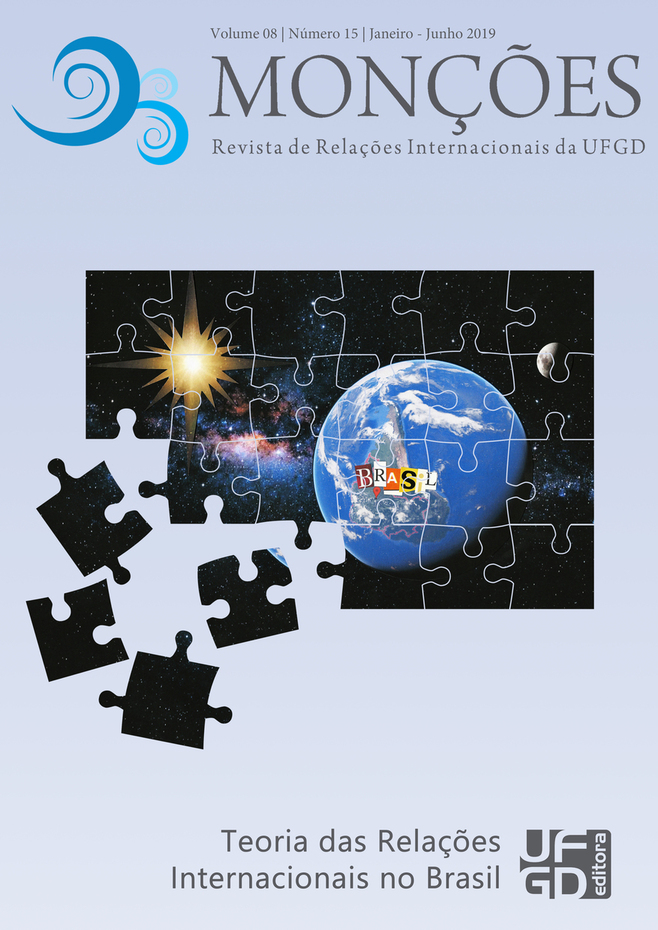Rethinking East-West borders: cultural encounters, narrative and trespassing in Fatema Menissi’s writings
DOI:
https://doi.org/10.30612/rmufgd.v8i15.11547Keywords:
cultural encounters, Fatema Mernissi, non-Western feminism.Abstract
The article focuses on the reflections of feminist writer and activist Fatema Mernissi. It addresses Mernissi´s critical engagements with the theme of cultural encounters and boundaries and her attempts to answer the question: What is at stake in thinking and writing between East and West? And also, on how different responses to such questions might offer different frameworks for a decolonial approach aiming at a “double critique” in the face of totalizing knowledge – whether Western or non-Western – without the setback of effacing one´s locus of enunciation and experience of resistance of marginal subjects – here, Muslim women more specifically. In this way, I intend to explore a specific aspect of Mernissi’s work, namely, her use of creative narrative strategies mixing autobiography and fiction in attempting to set conditions for challenging dominant representations of the Orient and to promote “transcoding” – i.e. the construction of new meanings over ancient established ones aiming to expose the violent dimensions of cultural encounters, but also rethinking the possibilities of engaging and dialogue with difference.
Downloads
References
ABU-LUGHOD, Lila. Review “Orientalism” and Middle Eastern Studies. Feminist Studies, vol.27, n.1, 2001, p.101-103.
_____. Writing women’s worlds: Bedouin stories. Berkeley: University of California Press, 1993.
APPADURAI, Arjun. Modernity At Large – Cultural Dimensions of Globalization. University of Minnesota Press, 1996.
BENSMAÏA, Rèda. Experimental Nations or the Invention of the Maghreb. Princeton: Princeton University Press, 2003.
BERNARDI, Floriana. Gazes, Targets, (En)visions - Reading Fatima Mernissi through Rey Chow. Social Semiotics, 20:4, 2010, p. 411-423.
BOURGET, Carine. Complicity with Orientalism in Third-World Women's Writing: Fatima Mernissi's Fictive Memoirs. Research in African Literatures, vol. 44, 3, 2013, p. 30-49.
DERRIDA, Jacques; DROIT, Roger-Pol. "Quest-ce que la Déconstruction?". In: Le Monde, 12 de outubro de 2004. Disponível em: <http://medias.lemonde.fr/medias/pdf_obj/sup_pdf_derrida_111004.pdf> Acessado em 22 de outubro de 2016.
HALL, Stuart. The West and the Rest: Discourse and Power. In: _____ ; GIEBEN, Bram (eds.). Formations of Modernity. Cambridge: Open University, 1992, p. 275-331.
HOBSON, John. The Eastern Origins of Western Civilisation. Cambridge: Cambridge University Press, 2004.
INAYATULLAH, Naeem; BLANEY, David. International Relations and the Problem of Difference. New York/London: Routledge, 2004.
JEBARI, Idriss. Rethinking the Maghreb and the Post-Colonial Intellectual in Khatibi`s Les Temps Modernes Issue in 1977. The Journal of North African Studies, 2017, p. 1-18.
KHATIBI, Abdelkebir. Amour Bilingue. Montpellier: Fata Morgana,1990.
_____. Double Critique. In: Maghreb Pluriel. Paris/Rabat: Denöel, 1983(1970), p.43-112.
_____. Le Maghreb Comme Horizon de Pensée. Paris: Les Temps Modernes du Maghreb, 375, 1977, p. 7-20.
_____. L`Orientalisme Désorienté. In: Maghreb Pluriel. Paris/Rabat: Denöel, 1983(1974), p.113-146.
_____. Pensée-autre. In: Maghreb Pluriel. Paris/Rabat: Denöel, 1983(1981), p.9-42.
MATOS, Marlise. Movimento e Teoria Feminista: É Possível Reconstruir a Teoria Feminista a Partir do Sul Global? Curitiba: Revista de Sociologia Política, v. 18, n.36, 2010, p.67-92.
MERNISSI, Fatema. Doing Daily Battle: Interviews with Moroccan Women. New Brunswick/New Jersey: Rutgers University Press, 1988.
_____. Dreams of Trespass – Tales of a Harem Girlhood. New York: Addison-Wesley Publishing Co, 1994.
_____. Scheherazade Goes West – Different Cultures, Different Harems. New York: Washington Square Press, 2001.
MHURCHÚ, Aoileann Ní;SHINDO, Reiko. Introduction: being critical and imaginative in International Relations. In: ____(eds). Critical Imaginations in International Relations. New York: Routledge, 2016, p.1-10.
MIGNOLO, Walter. Epistemic Disobedience, Independent Thought and Decolonial Freedom. Theory, Culture & Society, vol. 26 (7-8), 2009, p. 159-181.
_____. Local Histories/Global Designs – Coloniality, Subaltern Knowledges, and Border Thinking. Princeton: Princeton University Press, 2012.
MOGHADAN, Valentine M. Feminist Movements in the Maghreb. In: Amrita Basu (ed.). Women’s movements in the Global Era – the Power of Local Feminisms. New York: Westview Press, 2a ed., 2017, p. 333-360.
OLIVEIRA, Jessica da Silva C. Postcolonial Maghreb and the Limits of IR. London: Palgrave Macmillan, 2019.
ONG, Walter J. Orality and Literacy – the technologizing of the Word. London/New York: Routledge, 2002.
SAID, Edward. Orientalism. New York: Vintage Books, 1978.
SAJED, Alina. Empire Writes Back: Between Dreams of Trespass and Fantasies of Resistance. Hamilton: McMaster University, Institute of Globalization & the Human Condition, Globalization Working Paper Series 6/7, 2006.
_____. Postcolonial Encounters in International Relations: The Politics of Transgression in the Maghreb. New York: Routledge, 2013.
SHILLIAM, Robbie (ed.). International Relations and non-Western Thought – Imperialism, Colonialism and Investigations of Global Modernity. New York/London: Routledge, 2012.
SMITH, Linda Tuhiwai. Decolonizing Methodologies: Research and Indigenous People. London & New York: Zed Books, 1999.
SPIVAK, Gayati Chakravorty. The Postcolonial Critic. In: HARASYM, Sarah (ed.). The Postcolonial Critic – Interviews, Strategies, Dialogues. London/New York: Routledge, 1990, p. 67-74.
TOUMI, Alek B. Maghreb Divers: Langue Française, Langues Parlées, Littératures et Représentations des Maghrébins, à Partir d'Albert Memmi et de Kateb Yacine. New York: Peter Lang Inc., International Academic Publishers, 2002.
WIBBEN, Annick T.R. Feminist Security Studies: A Narrative Approach. New York: Routledge, 2011.
WOODHULL, Winifred. Transfigurations of the Maghreb: Feminism, Decolonization, and Literature. Minneapolis/London: The University of Minnesota Press, 1993.
ZAYZAFOON, Lamia Ben Youssef. The Production of the Muslim Woman: Negotiating Text, History, and Ideology. Oxford: Lexington Books, 2005.
Downloads
Published
How to Cite
Issue
Section
License
- Os autores e autoras mantêm os direitos autorais e concedem à revista o direito de primeira publicação, com o trabalho simultaneamente licenciado sob a Creative Commons Atribuição-NãoComercial-CompartilhaIgual 3.0 Brasil. que permite o compartilhamento do trabalho com reconhecimento da autoria e publicação inicial nesta revista.
- Autores e autoras têm autorização para assumir contratos adicionais separadamente, para distribuição não-exclusiva da versão do trabalho publicada nesta revista (ex.: publicar em repositório institucional ou como capítulo de livro), com reconhecimento de autoria e publicação inicial nesta revista.
- Autores e autoras têm permissão e são estimulados a publicar e distribuir seu trabalho online (ex.: em repositórios institucionais ou na sua página pessoal) a qualquer ponto antes ou durante o processo editorial, já que isso pode gerar alterações produtivas, bem como aumentar o impacto e a citação do trabalho publicado, porém invariavelmente com o reconhecimento de autoria e publicação inicial nesta revista.


